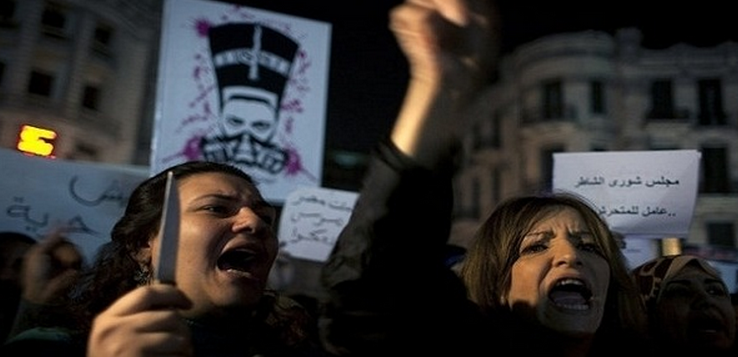Egyptian Women Say State-Sponsored Sexual Terrorism Goal of Muslim Brotherhood
/
Anne Is Reading
 Egyptian women activist wields a knife in recent protest.
Egyptian women activist wields a knife in recent protest.
Sexual assault in Egypt’s public squares.
“Sometimes,” said Adel Abdel Maqsoud Afifi, a police general, lawmaker and ultraconservative Islamist, “a girl contributes 100 percent to her own raping when she puts herself in these conditions.”
Egyptian women disagree and are speaking out loudly through the “newly aggressive news media” and social networking. Today’s New York Times takes us back to the days of the revolution in Tahrir Square. AOC reported that the women were very present for 18 days and sexual assaults were at a minimum.
Then came the horrific assault on CBS correspondent Lara Logan, an event that signaled a new era in Egypt.
Logan’s assault was relived recently by Hania Moheeb, 42, a journalist who is one of at least 18 assaulted in Tahrir Suqare on Jan 25. Of the six women hospitalized, one woman was stabbed in her genitals and another received a hysterectomy.
To alleviate the social stigma usually attached to sexual assault victims in Egypt’s conservative culture, her husband, Dr. Sherif Al Kerdani, appeared alongside her.
“My wife did nothing wrong,” Dr. Kerdani said.
In an astounding story, Yasmine Al Baramawy recalled her own attack last November. Not only were knives used to cut most of the clothes off her body, but she was then pinned half-naked to the hood of a car and driven in a slow, hourlong drive. Her attackers told people she had a bomb on her abdomen so that people wouldn’t help her.
The Times further reports that women are marching in the streets holding knives above their heads. “Don’t worry about me,” said Abeer Haridi, 40, a lawyer. “I’m armed.”
Egyptian Women’s Spirit
Al Arabiya reminds us that the struggle of Egyptian women is not new. Women joined men when French troops arrived at Alexandria in July 1798, fighting to defend the city.
After the withdrawal of the French in 1801, Egyptian women continued their struggle against tyranny as they took to the streets to protest against the financial policies of the Ottoman Empire. In 1806, the women from Damanhur in the Nile Delta took part in defending the city against the invasion of Mamluk leader Mohamed Bey al-Alfi. In Rosetta, women fought with men against the siege imposed on the city by British troops; in 1951 they launched an initiative calling for the boycott British goods; and in 1956 they courageously defended Suez Canal cities.
Just recently the International Union for Muslim Scholars, headed by Egyptian cleric Yusuf al-Qaradawi, issued a document condemning the proposed UN document on combatting violence against women. AOC reported that Egyptian diplomat Mervat Tallawy, surprised delegates when she ignored the Brotherhood and announced that Egypt would join consensus.
The Egypt Independent published an in-depth analysis of the Muslim Brotherhood and the National Countil for Women and the state of women in Egypt today.
Dalia Abdel Hameed, gender and women’s rights program officer at the Egyptian Initiative for Personal Rights, calls the Muslim Brotherhood’s agenda “not surprising”.
The Brotherhood adopts an approach that rejects equality as a concept and is dismissive of women’s rights, she says, all the while leaning on a religious and culture discourse.
“This is an old, destructive weapon because Egypt is a diverse culture, and we currently live in a global community,” Abdel Hameed says.
It’s Sexual Terrorism
Outraged women and men in Egypt have formed groups such as Operation Anti Sexual Harassment and Tahrir Bodyguard.
“We do not want to use the term ‘harassment.’ What is happening today is sexual terrorism,” said Inas Mekkawy, a women’s rights activist with the group Baheya. Egypt Daily News reports that ‘Baheya Ya Masr’ celebrated its first anniversary.
In February, Baheya issued a statement that the group will press legal charges against the authorities they believe are behind the sexual assaults on female demonstrators. Charging that the purpose of sexual violence is to break the will of Egyptian women, Baheya insists that it will fight back.
Writing for The Daily Beast, Mike Giglio quotes Elhan Abdelhamid, a professor at Cairo University and members of the National Council for Women who worries about the under the radar threats to women.
For example, she said that Islamists are pushing to rewrite school textbooks to reflect their conservative views on women, and have even been pressuring teachers to fall into line. “They are trying to change society from the inside,” she said.
Key AOC Articles
ALL women of Egypt
Please Do Not Catcall Me: From Rittenhouse to Tahrir Square
New Calls in Cairo’s Tahrir Square ‘Go Home and Wash Clothes’
Egyptian Women Unite, Saying “We Are All Lara Logan”
Brutally Assaulted in Egypt | Lara Logan’s Career As Top Reporter
Egyptian Protests Free of Sexual Harassment Against Women
American Media Ignores Egyptian Women Protestors | They’re Not All Home Under Male Protection
In Egypt, Large Numbers of Veiled (Scarved) and Niqab-Wearing Women Sexually Harassed on the Streets




















































